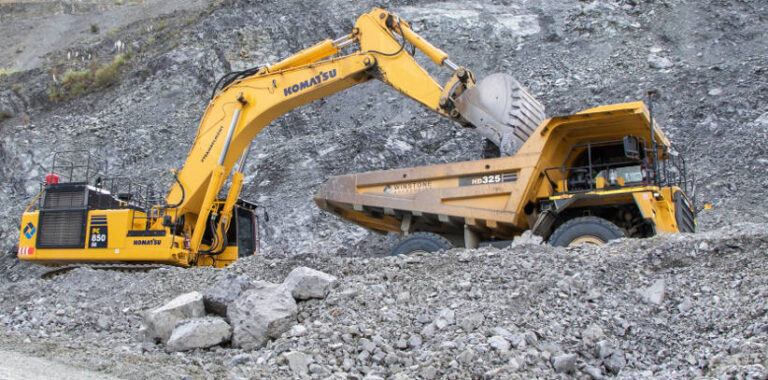It was going to be the ultimate in one-upmanship. The two largest quarries servicing Wellington, New Zealand’s giant $NZ850million Transmission Gulley motorway project – one of the most complex in the nation’s history – were each looking for a way to bring new efficiency to the job and win major business.
The Transmission Gulley project was for some months up to 50 percent of their total volume, so competitive advantage was vital. The answer was in securing an excavator so powerful, with so much capacity and yet so cost effective, that it would set new standards.

“I went down to Wellington Harbor to welcome my new Komatsu PC850-8EO Super Excavator when it arrived on the ship from Japan – and there were two of them on board,” Shane Hagai, Manager of the Winstone owned Belmont Quarry said.
“I asked who owns the other one, but I already knew the answer. There was only one other quarry that would order it.”
Matt Hill, Quarry Manager of the Horokiwi Quarry which operates just seven kilometres from Belmont Quarry, both equidistant from the Transmission Gulley project, chuckles at the recollection:
“Just ask Shane who took delivery first – he’ll tell you it was him, and I reckon it was us.”
In fact, the commissioning occurred simultaneously, although Shane concedes his was held up perhaps two days, mainly because of some signwriting he wanted done.
“Our operator is just so proud – he parks it up each night high on the hill so it can be seen by the whole Hutt Valley, and there’s not a scratch on it.”
For five years both quarries have competed for, and shared, most of the massive supply of aggregate to the 27 kilometre four lane motorway, due for completion at the end of this year.
The call for material has led to the quarries digging deeper into their resource of hard Greywacke rock unique to the region, made possible by the strength and power of the PC850 – the largest of Komatsu’s construction excavator fleet.
The coincidental-Komatsus have levelled the playing field, to the benefit of their Transmission Gulley client.
Drill and blast, to loosen rock, has become a thing of the past for both quarries.
“We used to blast once every three months, now not at all,” Shane said. “Our PC850 operator can extract more rock with greater efficiency and in far greater comfort than ever before,” Matt said.
Both companies are filling their 40 tonne Komatsu dump trucks with five passes of the PC850, compared to six to seven passes with machinery they were previously using.
Fuel efficiency through streamlined workload has been increased compared to previous machines. Komatsu’s push-to-activate boom power mode has been the key to more efficient extraction. Both quarries also share the same service arrangement, with Komatsu appointed Machinery Specialists, an investment in Komatsu operators in the Wellington area which has substantially increased the company’s local footprint.
“They’ve turned out on Sunday to service our PC850, to keep us competitive,” both Shane and Matt independently volunteered.
Shane Hagai estimates his Belmont Quarry has contributed better than 1.6 million tonnes of aggregate to the Transmission Gulley project; Matt Hill is less specific, but it could be about the same.
“I sit in my office and watch his trucks go by,” Shane said.
It’s a friendly rivalry – the companies tend to lean on each other to ensure they both service the project, made difficult by extremes of terrain, climate and external factors, like the 2016 Kakoura earthquake which diverted resources for some time.
“We all got together for a beer at Christmas,” Matt said.
Both quarries acknowledge that their new acquisitions have given them opportunity to better service their long-term client base at the conclusion of the Transmission Gulley project.
Wellington is uniquely placed in New Zealand, and the ability for civil and infrastructure projects to be serviced locally, reducing transports costs, is paramount for efficient future development.
According to Matt even greater earthquake proofing measures had placed increasing demand on aggregate for new building projects. But both also are eying new roadworks programs recently announced in a sweeping $NZ6.8 billion commitment by the NZ Government.
“One of them is just up the road from here, right between us,” Shane said.
The rivalry, it seems, will continue.






